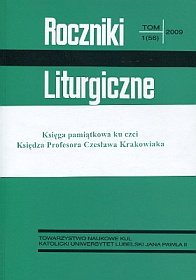Catechesis before Confirmation for Persons with Intellectual Disability
Abstract
Polish catechists reject two opposing attitudes as follows: the first assumption suggesting, that persons with intellectual disability should achieve the same level of awareness and knowledge, as other fit and able baptised persons; the second assumption suggesting, that it is not at all possible to catechise persons with intellectual disability. The primary assumption of the concept of catechesis is, that persons with intellectual disability should be provided with possibility to familiarise with the mystery of Jesus Christ. Polish catechists emphasize the difficulty to evaluate accurately the degree of psychological or intellectual capabilities of persons with intellectual disability. Moreover, it is difficult to establish what communication capabilities those persons possess. That is why it is hard (or even completely impossible) to evaluate spiritual capabilities of persons with intellectual disability, in particular regarding persons with profound intellectual disability. In fact, nothing will happen automatically in catechesis for persons with intellectual disability. Thus, patience and stressing the most essential matters are of significant importance while preparing persons with intellectual disability for receiving sacraments. Focussing attention on the basic issues of Christianity does not involve rejection of other elements of evangelical message.
Copyright (c) 2009 Liturgical Annals

This work is licensed under a Creative Commons Attribution-NonCommercial-NoDerivatives 4.0 International License.

